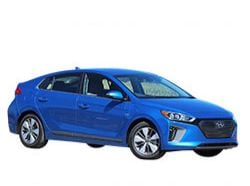2018 Hyundai Ioniq Pros vs Cons

What's New for 2018?
The plug-in variant is brand-new for the 2018 Hyundai Ioniq. Other than this rather remarkable addition, nothing else is new. All of 2017's awesome features and specs carry over to the 2018 lineup.
Ten Reasons You May Like the 2018 Hyundai Ioniq – The Pros
1. The Plug-In Hybrid Variant
Hyundai deserves a round of applause for bringing the 2018 Hyundai Ionqiq into the plug-in hybrid market for this year. The plug-in has an electric motor that generates 45 kw (or 60 hp), and its battery pack gives the vehicle 8.9 kwh. It can be driven on electric-only while the battery still has power, but the engine will switch when you push the vehicle to accelerate.
2. A Chic-But-Restrained Look
If you have driven a Hyundai before, the Ioniq will look very similar to whatever you might have driven. For Hyundai lovers, this is a good thing. Hyundai maintains a classic and restrained appeal, and its simplicity in style is something that average consumers will appreciate.
3. Best-In-Class Fuel Economy
The Ioniq cannot be topped when it comes to its fuel economy. It has a best-in-class (and possibly best for any vehicle, ever) rating of 58 mpg. If you're looking for the most fuel-efficient vehicle that won't drain your bank account, the Ioniq is it.
4. Controls are Simple
The interior setup along the dash makes sense. Everything is arranged in a way that is easy for the driver to reach, and all controls are clearly marked. There is no guesswork as to which buttons are for specific functions. Even non-tech-savvy drivers will have an easy time figuring out the controls.
5. A Long Electric Charge Range
While it doesn't best the Chevy Bolt EV, the 2018 Hyundai Ioniq gets a relatively decent electric charge range. The Ioniq EV gets a solid 124 miles of electric range, which is better than what you will find on most competitors. However, Hyundai might be looking to best the Bolt EV's electric range in 2019, so if you need a long electric range, you might want to wait one more year.
6. Excellent Ride Quality
The 2018 Hyundai Ioniq has an impressive ride quality regardless of which model you drive. The tires do a good job at absorbing shocks, and the interior feels comfortable enough to make long drives. All in all, the Ioniq provides smooth sailing at slow speeds and is even pretty solid at highway speeds.
7. A Spacious Interior
This vehicle doesn't seem spacious from the outside, but it is once you slide inside. Although the rear seats are slightly cramped (as is typical with hatchback hybrids and EVs), the front seats have plenty of head, shoulder, and leg space. Since the vehicle is rather wide, passengers will feel spaced well enough apart from each other in the rear.
8. Minimal Engine Noise
You will only hear a minimal amount of engine noise while revving on the highway. Otherwise, you're not going to hear anything, as the 2018 Hyundai Ioniq tends to purr like a kitten, especially at slower speeds.
9. Plenty of Active Safety Features
Hyundai has loaded the Ioniq up with a long list of active safety features. These features include blind spot monitoring, rear cross-traffic alert, adaptive cruise control, forward collision warning, and automatic emergency braking. Also, active lane control comes standard on all models.
10. The Ultimate Package
If there is one package you need, it is the Ultimate Package. It can be added onto any of the three models, and it contains a bunch of desirable active safety features like rear parking sensors and swiveling headlights. You also get built-in navigation, a beautiful 8-inch touchscreen, the 8-speaker Infinity premium sound system, rear vents, more driver's seat memory, and wireless device charging abilities.
Reasons You May Not Like the 2018 Hyundai Ioniq – The Cons
1. Not Much Cargo Space in the EV
The battery severely limits the amount of cargo space available on the EV version. The EV has 23.8 cubic feet of cargo space, which is better than the Bolt EV but is definitely less than what you get in the straight-up Ioniq hybrid.
2. It Might Look Too "Normal"
For those unfamiliar with Hyundais, the interior styling might look a bit too boring and normal. It isn't meant to be an extravagant vehicle since the focus is really on fuel economy and environmental friendliness. However, there are hybrids and EVs with more eye-catching interior designs that might lure some customers away from the Ioniq.
3. An Industry Average Power Output
Power output is not terrible, but it is definitely industry average. Since the Chevy Bolt is pushing a lot of boundaries for power output, Hyundai is going to have to step it up if they want to continue competing and put out truly powerful hybrids and EVs. However, potential customers should know that other vehicles in this class might have similar power outputs but manage to feel more sluggish than the Ioniq.
How it stacks up to the competition:
2018 Hyundai Ioniq vs. 2018 Chevy Bolt EV
The 2018 Chevy Bolt is probably one of the most popular hybrid and electric variants. The EV is especially impressive with its massive 238 mile range, which is best-in-class. However, the Bolt's styling leaves a lot to be desired and is possibly even more dull than the Ioniq.
2018 Hyundai Ioniq vs. 2018 Volkswagen e-Golf
The 2018 VW e-Golf is a relatively powerful vehicle with a good amount of get-up-and-go power. It has a decent range of 125 miles, which puts it on-par with the Ioniq. On the downside, the e-Golf is not the best bang for your buck, as its elevated price isn't worth it for the industry-average range. The Ioniq is a more affordable option.
Conclusion
The 2018 Hyundai Ioniq offers three solid model choices and puts out a decent amount of power. For what you get, the price is quite reasonable. The Ultimate Package is definitely worth the extra amount and really adds to the sense of safety you get while driving along in the Ioniq.
• 2018 Hyundai Accent
• 2018 Hyundai Elantra
• 2018 Hyundai Ioniq
• 2018 Hyundai Kona
• 2018 Hyundai Santa Fe
• 2018 Hyundai Sonata
• 2018 Hyundai Tucson
• 2018 Hyundai Veloster

